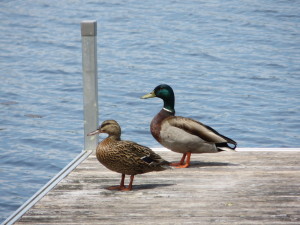Dana Little, June 1, 2010
The law protects any migratory birds from harassment or injury but does not prevent you from feeding them. According to Judy Camuso of Inland Fisheries and Wildlife, feeding ducks and geese on Taylor Pond is not against the law, but it’s not a good idea, for several reasons.
Attracting large numbers of ducks and geese into a small area produces a huge amount of concentrated excrement. One goose produces about 1/3 pound of feces per day and a duck, about half that. This winter I counted over 200 ducks being fed by one person. This produced 2 tons of fresh manure, yielding over 11 pounds of phosphorous, potentially affecting water quality.
A pair of Mallards hang out on the dock.
“Swimmer’s itch” comes from a parasite called Schistosomiasis released into the water through duck feces. The more ducks concentrate in an area, the more likely the disease will affect swimmers. When eggs in duck waste hatch, the small larvae (miracidia) then infect snails. The larvae mature into cercariae which leave the snail to infect another duck. Immature parasites can burrow into the skin of human swimmers and waders, causing an itching rash for up to one week. Ducks also carry Salmonella, a bacteria, that can infect both people and animals and cause bloody diarrhea.
Over the years I have spotted 14 different species of ducks on the Pond. Many use it as a staging point on their migration to and from water in northern Maine and Canada. We have at least six species known to breed on Taylor Pond in the summer: Wood, Mallard, and Black Ducks, Hooded and Common Mergansers, and Canada Geese.
I do not recommend feeding the ducks. If you do feed them, understand that an artificial diet may cause Duck Virus Enteritis that can kill off the entire population. The only artificial diet should be high quality grains that are free of mold or spoilage. However, ducks routinely fed on such a diet tend to become obese, develop heart disease, liver problems and malnutrition. Uneaten food should be quickly removed because left over food will attract rodents and can quickly grow a fungus, Aspergillus, that is fatal to ducks. Rotting food may contain botulism that quickly kills ducks.
An overfed duck will not be able to fly as fast or escape from predators. In addition, when food is provided in the winter they may not migrate to a climate more suitable for them. The best nutrition for a duck consists of natural foods growing in their environment that allow them to be trim, fly fast and stay healthy.
If you must feed the ducks, provide food only intermittently and in small amounts to avoid large collections of birds. Finally, I hope that you will, most of all, appreciate the wild nature of the ducks, keeping them at a distance.
